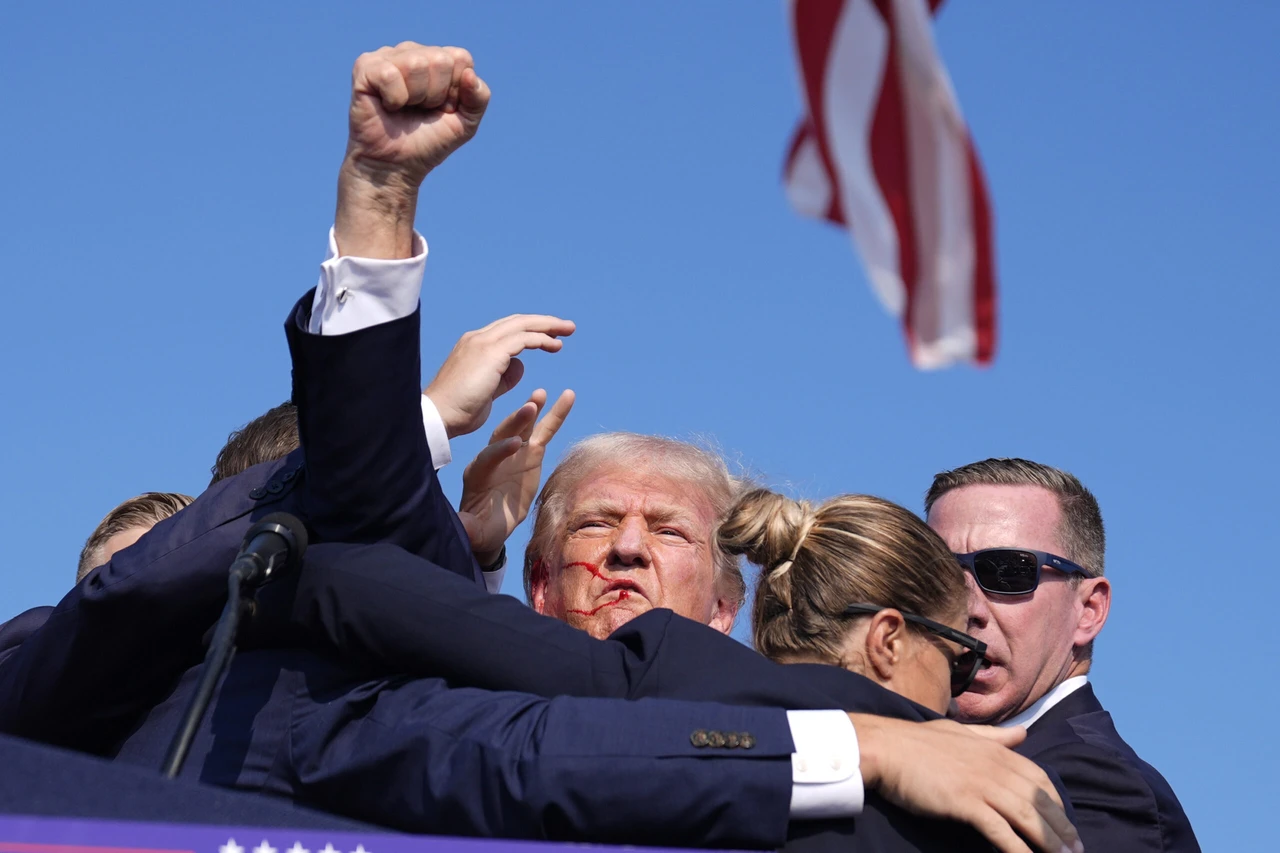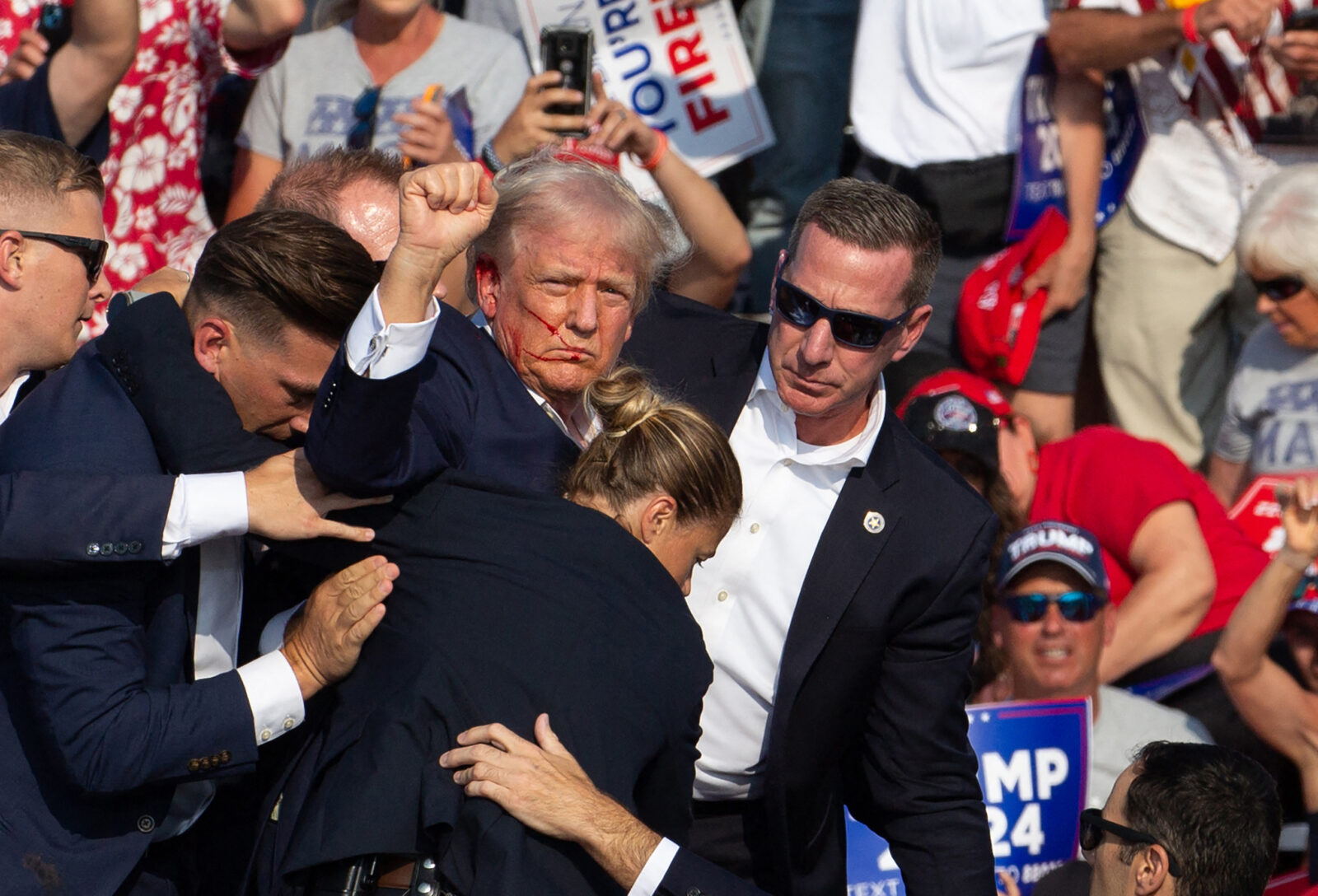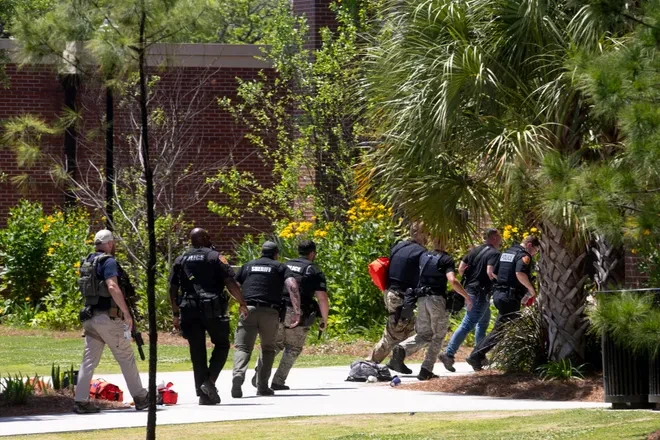Shooter misses Trump, kills Biden’s presidential bid
 Former U.S. President Donald Trump is surrounded by Secret Service agents at a campaign rally, in Pennsylvania, U.S., July 13, 2024. (AP Photo)
Former U.S. President Donald Trump is surrounded by Secret Service agents at a campaign rally, in Pennsylvania, U.S., July 13, 2024. (AP Photo)
In a shocking turn of events on Saturday, Former President Donald Trump, the Republican candidate for the 2024 presidential election, narrowly escaped an assassination attempt while on the campaign trail.
The incident, which has sent shockwaves through the US political landscape, may have inadvertently bolstered Trump’s bid for the presidency, echoing historical instances where surviving an assassination attempt has reinforced a candidate’s political fortunes.
The incident happened as Trump was addressing his supporters at a Pennsylvania campaign stop. Loud gunfire sounds were captured on live video, and his security detail reacted right away.
Secret Service swiftly approached and removed the former president, who had blood on his right ear, from the podium. Trump was dragged away, but not before pumping his fist to the crowd despite his apparent injuries.

Donald Trump’s act of resilience and telling the Secret Service to ‘wait’ as they dragged him off the stage resembled Theodore Roosevelt’s historic act of toughness on 1912.
Elon Musk also pointed out this on his resemblance X, formerly twitter, swiftly after the incident.
Survival of the fittest: Historical instances of candidates benefiting from assassination attempts
Surviving an assassination attempt has historically played a significant role in bolstering the political fortunes of US presidential candidates. In the annals of American politics, those who have faced such life-threatening incidents have often seen a surge in public sympathy and support, which translated into electoral success. Notably, all major presidential candidates who survived assassination attempts went on to win their respective elections.
Andrew Jackson (1835)
Andrew Jackson faced an assassination attempt by Richard Lawrence, who fired two pistols at him at close range. Remarkably, both guns misfired, and Jackson subdued his attacker. This incident enhanced Jackson’s image as a strong and resilient leader, further solidifying his already formidable reputation and contributing to his political legacy.
Ronald Reagan (1981)
Ronald Reagan was shot by John Hinckley Jr. outside a Washington, D.C. hotel. Despite being seriously wounded, Reagan’s recovery and his immediate return to office demonstrated his toughness and dedication to his role.
The public’s admiration for his resilience played a key role in his subsequent political success, boosting his approval ratings from roughly 60% to nearly 73% and aiding his re-election campaign in 1984.
Before the assassination attempt, Reagan’s approval ratings were relatively stable. In early 1981, Reagan’s approval ratings hovered around 60%.
After the shooting, Reagan’s approval ratings surged dramatically. By mid-April 1981, just a few months after the incident, Reagan’s approval ratings had climbed to approximately 73% according to Gallup polls
Theodore Roosevelt (1912)
Perhaps the most striking example is Theodore Roosevelt. In 1912, while campaigning as a third-party candidate for the Progressive “Bull Moose” Party, Roosevelt was shot by John Flammang Schrank.
Despite the bullet lodging in his chest, Roosevelt insisted on delivering his scheduled speech, famously declaring, “It takes more than that to kill a Bull Moose.” This act of extraordinary bravery and determination captivated the nation and significantly boosted his campaign.
Roosevelt’s resilience drew widespread admiration, and while he did not win the 1912 election, his remarkable survival and the manner in which he handled the aftermath cemented his legacy as one of the most determined and robust figures in American political history.
After the shooting, Roosevelt’s popularity soared. According to historical records, his campaign experienced a noticeable boost in support. In the weeks following the incident, his public approval and media coverage were highly favorable.
His actions exemplified the potential for a candidate to turn a life-threatening situation into a powerful narrative of strength and perseverance, leaving an indelible mark on the electorate.
Will the assassination attempt benefit Trump?
Drawing a parallel to the recent assassination attempt on Donald Trump, history suggests that such an event could have a profound impact on his campaign. Public sympathy, combined with a portrayal of resilience, can significantly enhance a candidate’s image, potentially swaying undecided voters and reinforcing support among existing followers. Like Roosevelt, Trump could leverage this incident to portray himself as a steadfast leader undeterred by extreme adversity, potentially strengthening his bid for the presidency.
The historical context of assassination attempts on US presidential candidates underscores a pattern: surviving such a threat not only humanizes the candidate but also often galvanizes public sentiment in their favor.
Unsurprisingly, given Trump’s reputation among his critics as a less-than-humane opponent, supportive statements from his rivals in a time of crisis – such as U.S. President Joe Biden and former President Barack Obama, with whom Trump often exchanged harsh remarks – flooded the political landscape.
The supportive statements are expected to humanize Donald Trump, providing a counter-narrative to the ‘inhumane’ characterization often voiced by political experts.
Despite the absence of post-assassination attempt polling data, Donald Trump’s chances of winning the election have surged 9% to a record 70% in the largest prediction market, Polymarket.
Before the assassination attempt, national polls showed Trump leading Biden by just a narrow 2% margin. However, drawing a parallel to Ronald Reagan’s significant 13% boost in polls following his survival of an assassination attempt, and considering Polymarket’s reported 9% increase in Trump’s odds, it is highly plausible that the recent attempt on Trump’s life will substantially benefit him in the polls.



